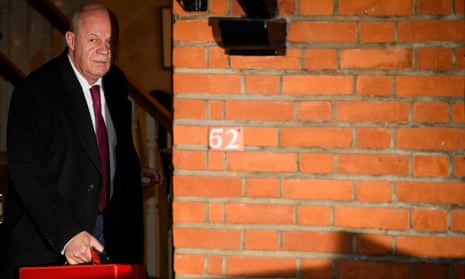Damian Green has been sacked as first secretary of state after admitting he lied about the presence of pornographic images on his House of Commons computer.
An investigation by the cabinet secretary, Sir Jeremy Heywood, found that Green’s vehement denials after a Sunday newspaper reported that porn had been found on his computer were “inaccurate and misleading”.
His departure is a personal blow for Theresa May, who brought him into Downing Street after her majority was wiped out in June’s general election to help shore up her authority.
He is the third cabinet minister to step aside since early November, following the departures of Michael Fallon and Priti Patel.
In a letter responding to his resignation, the prime minister said she was “extremely sad” about losing Green from government. May said it was “with deep regret and enduring gratitude for the contribution you have made over many years that I asked you to resign from the government and have accepted your resignation”.
In his resignation letter, Green continued to maintain that he did not “download or view” the pornography, but added that he “should have been clear in my press statements”, that his lawyers were informed about its presence in 2008 – and that he discussed it with the police in 2013.
Heywood found Green had twice breached the ministerial code, because his misleading comments had fallen short of the “seven principles of public life”, one of which is honesty.
He was unable to reach a definitive conclusion on separate allegations, made by the Tory activist Kate Maltby, that Green had behaved improperly towards her.
The cabinet secretary’s report found that Maltby’s account of a disputed meeting was “plausible”, but “with competing and contradictory accounts of what were private meetings, it is not possible to reach a definitive conclusion”.

In his letter, Green said: “I deeply regret the distress caused to Kate Maltby following her article and the reaction to it. I do not recognise the events she described in her article, but I clearly made her feel uncomfortable and I apologise.”
Maltby did not comment publicly on Wednesday evening, but her parents, Colin and Victoria Maltby, released a statement: “We are pleased that the Cabinet Office has concluded its inquiry into the conduct of Damian Green. We are not surprised to find that the inquiry found Mr Green to have been untruthful as a minister, nor that they found our daughter to be a plausible witness.
“We have received many supportive messages from people near and far who appreciate Kate’s courage and the importance of speaking out about the abuse of authority. We join with them in admiring her fortitude and serenity throughout the length of the investigation and despite the attempted campaign in certain sections of the media to denigrate and intimidate her and other witnesses. We are proud of her.”
In her letter to Green, May welcomed the fact that he had apologised to Maltby.
Speaking on Thursday morning, the health secretary, Jeremy Hunt, acknowledged that Green had been sacked for lying, adding: “I think lots of people who understand the context would appreciate why that might have happened. But that doesn’t make it any more acceptable.”
He told BBC Radio 4’s Today programme the episode showed that cabinet ministers were held to the “very highest standard of conduct”. But, he said: “I think we should probably remember that those are standards that would probably not apply in other countries.”
Labour’s Jess Phillips told the same programme the decision had taken too long and that the allegations made by Maltby were still hanging over Green.
“The investigation said that Kate Maltby was credible and plausible and what they found that they couldn’t prove was the sexual harassment charge.
“However, I’m not convinced by that. I’ve seen all of the evidence that’s in the public domain: text messages between Damian Green and Kate Maltby, text messages between Kate Maltby and her friends at the time, saying how uncomfortable she’d felt, whether she felt she had to report it.”
She said that, although it was not officially acknowledged, she believed those allegations had contributed to May’s decision to sack Green.
The prime minister also used her letter to criticise the conduct of police officers who carried out the raid on Green’s parliamentary office in 2008, when the pornography was discovered, and revealed aspects of the case to the media in recent weeks.
“I shared the concerns raised from across the political spectrum when your parliamentary office was raided in 2008 when you were a shadow minister holding the Labour government to account,” she said. Green’s office was raided as police investigated a series of leaks from inside the Home Office.
The allegations about porn being found on his computer were the latest chapter in a long-running feud between Green and Bob Quick, the former assistant commissioner of the Metropolitan police, who oversaw the raid almost a decade ago.
Following a Sunday Times report last month claiming there was “extreme” pornography on his parliamentary computer, which quoted Quick, Green issued a hard-hitting late night statement branding him “a tainted and untrustworthy source” who had been trying for some time to cause him political damage.
He dismissed the porn allegations as “false, disreputable political smears from a discredited police officer acting in flagrant breach of his duty” and “little more than an unscrupulous character assassination”. Quick subsequently threatened to sue Green for libel.
May was handed Heywood’s report on Monday, and subsequently sought a second opinion from Sir Alex Allan, the prime minister’s independent adviser on ministers’ interests.
Quick GuideDamian Green's comments on the porn allegations
Show

What Damian Green said:
4 November
“The police have never suggested to me that improper material was found on my parliamentary computer, nor did I have a ‘private’ computer, as has been claimed.
"The allegations about the material and computer, now nine years old, are false, disreputable political smears from a discredited police officer acting in flagrant breach of his duty to keep the details of police investigations confidential, and amount to little more than an unscrupulous character assassination."
11 November
"I reiterate that no allegations about the presence of improper material on my parliamentary computers have ever been put to me or to the parliamentary authorities by the police. I can only assume that they are being made now, nine years later, for ulterior motives."
20 December
“I accept that I should have been clear in my press statements that police lawyers talked to my lawyers in 2008 about the pornography on the computers, and that the police raised it with me in a subsequent phone call in 2013.
"I apologise that my statements were misleading on this point. The unfounded and deeply hurtful allegations that were being levelled at me were distressing both to me and my family and it is right that these are being investigated by the Metropolitan police’s professional standards department.”
A summary of the investigation, released by No 10 on Wednesday night, said: “Mr Green’s statements of 4 and 11 November, which suggested that he was not aware that indecent material was found on parliamentary computers in his office, were inaccurate and misleading, as the Metropolitan police service had previously informed him of the existence of this material.”
As first secretary of state, Green effectively acted as deputy prime minister, standing in for May at prime minister’s questions and sitting alongside her on the frontbench in the Commons.
Green was a friend of May’s from when the pair were at Oxford University together, and one of a handful of older ministers she brought back into government when she arrived in Downing Street in July last year and dispatched many of David Cameron’s allies to the backbenches.
May flies to Poland at the start of a two-day foreign trip on Thursday, and is not expected to appoint a replacement for Green until parliament returns from its Christmas recess in the new year.
She is then expected to carry out a wider reshuffle, bringing some of the new generation of Conservative MPs into the cabinet in order to refresh the government.
The allegations about Green emerged as women began to share their experiences of sexual misconduct in political life after the revelations of inappropriate behaviour by media mogul Harvey Weinstein.
Fallon stepped down as defence secretary after admitting he had not met the standards required of the armed forces of which he was in charge, after the journalist Jane Merrick said he had lunged at her after a lunch.
Several other investigations are continuing, including that into trade minister Mark Garnier, who admitted asking an assistant to buy sex toys.
Green has continued to carry out his ministerial duties since the investigation was announced, and colleagues – including the Brexit secretary, David Davis – supported him in the face of the allegations made by the police officers.
A retired Met detective, Neil Lewis, went public with claims that “thousands” of thumbnail images of legal pornography had been found.
Following Lewis and Quick’s interventions, Cressida Dick, the Met’s commissioner, said former officers who spoke out about investigations could face prosecution.
Labour said it was right that May had “finally been forced to sack” Green. A spokesperson said: “The public deserve the highest standards from ministers, which begs questions around the prime minister’s judgment and why she delayed this decision for so long. To lose her number two in government in such a way, and so soon after two other ministers, leaves her further weakened.”







